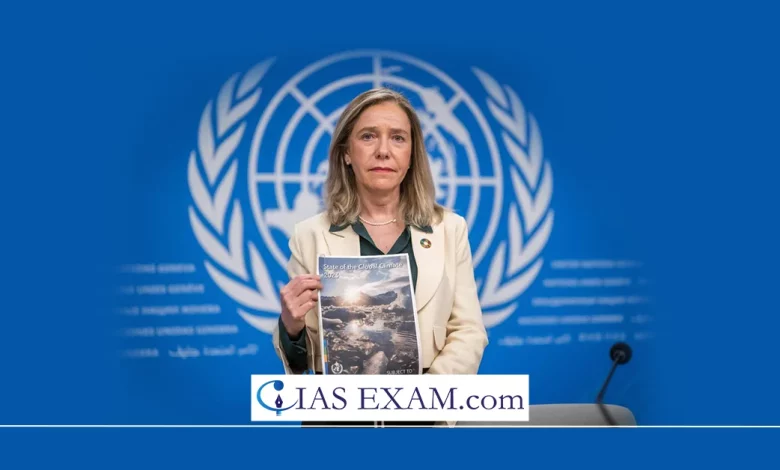Poll Campaigns in India must reflect Climate Issues
GS Paper 2 - Conservation of Environment & Climate Change

Context
Recently, the State of Global Climate Report released by the World Meteorological Organization (WMO) states that 2023 was the hottest year in the recorded history of the planet. In this election season in India,the anxiety over climate change expressed by the WMO, the UN and scientific fraternity should motivate parties across the political spectrum to make their action plans clear.
Key Highlights of State of Global Climate Report
- The average temperature rise from pre-industrial levels has been 45 °C, with a margin of uncertainty of ±0.12 °C.
- The temperature rise is close to breaking the agreed limit of 5 °C by different nations.
- The WMO report states that 2023 was the warmest year by a clear margin and one where many records were breached – Records for a rise in ocean temperatures, glacier retreat, diminishing Antarctic ice cover, Sea level rise around the planet
- The heat content of the world’s oceans reached a record high in 2023, with the highest level of ocean heat content ever recorded.
- Slowdown of the Atlantic Meridional Overturning Circulation (AMOC), a system of ocean currents.
- Global average sea-surface temperatures (SST)were at a record high in 2023, with several months breaking previous records by significant margins.
- The global ocean experienced an average daily Marine Heatwave coverage of 32%, well above the previous record of 23% in 2016
Contextualizing Climate Change in India
- India, as one of the most vulnerable countries in the world facing climate change, faces a number of environmental challenges, including rising temperatures, erratic monsoons, extreme weather events and deteriorating air and water quality.
- These impacts not only threaten the country’s ecological integrity but also pose significant risks to public health, agriculture, livelihoods, and economic stability.
- Against this backdrop, the inclusion of climate issues in poll campaigns becomes imperative to address the root causes of environmental degradation and chart a sustainable path forward.
- One of the primary objectives of integrating climate concerns into poll campaigns is to raise awareness among voters about the urgency and severity of climate change.
- Political parties and candidates have a crucial role to play in educating the electorate about the interconnectedness of environmental degradation with socio-economic development and public welfare.
- By highlighting the tangible impacts of climate change on communities, ecosystems, and future generations, political leaders can mobilize public support for climate action and galvanize collective efforts to address environmental challenges.
Fostering Political Commitment
- Beyond raising awareness, climate-centric poll campaigns can help foster political commitment to prioritize climate action at both the national and local levels.
- Political parties and candidates can demonstrate their commitment to environmental sustainability by incorporating climate-friendly policies and initiatives into their electoral manifestos.
- From promoting renewable energy and sustainable agriculture to enhancing resilience to climate-related disasters and conserving natural resources, political leaders can articulate concrete action plans to tackle climate change and promote sustainable development.
- Perhaps the most crucial aspect of climate-centric poll campaigns is their potential to drive policy action and institutional reforms to address climate change effectively.
- By making climate issues a central theme of electoral discourse, political parties and candidates can create a conducive environment for policy innovation, legislative reforms, and institutional strengthening to mainstream climate considerations across sectors.
Way Forward
The imperative for climate-centric poll campaigns in India cannot be overstated. As the country grapples with the adverse impacts of climate change, it is incumbent upon political parties and candidates to prioritize climate issues in their electoral discourse. By raising awareness, fostering political commitment, and driving policy action, political leaders can play a pivotal role in advancing climate action and building a sustainable future for India. As the nation gears up for elections, let us seize this opportunity to integrate climate concerns into poll campaigns and pave the way for a greener, cleaner, and more resilient India.
SOURCE: The Hindu





.png)



